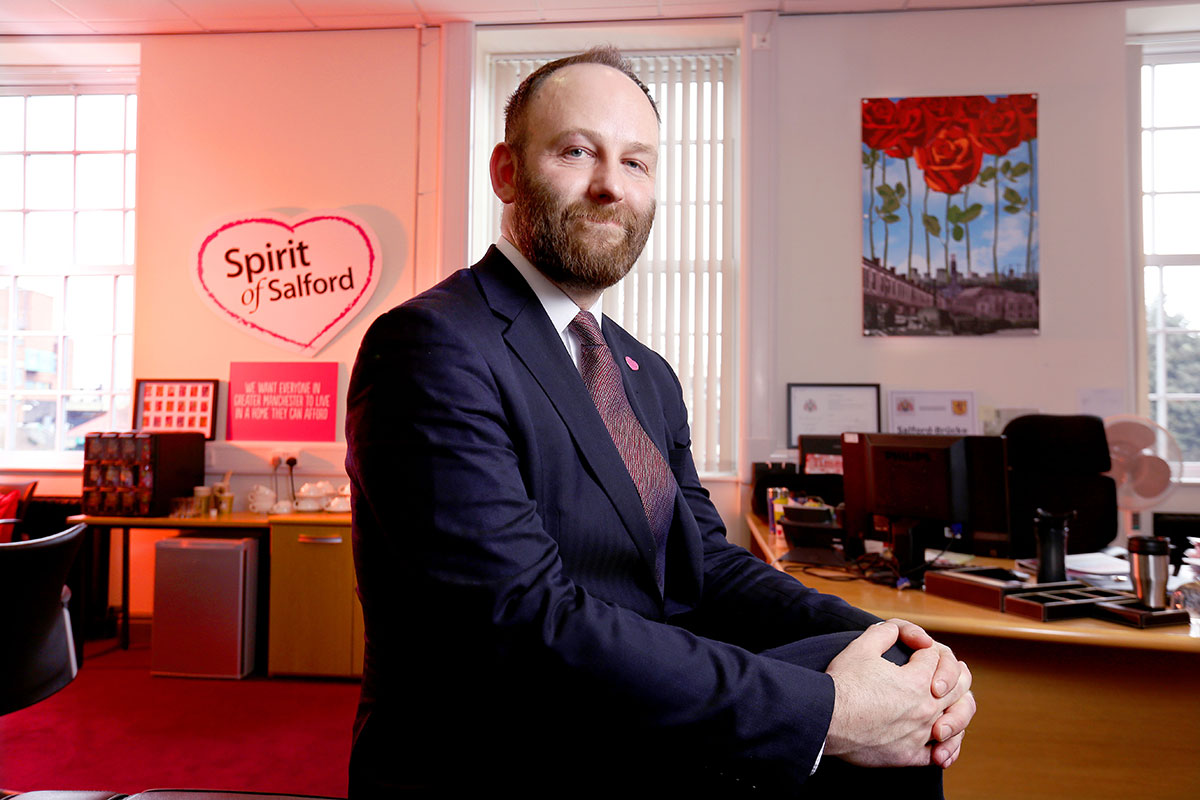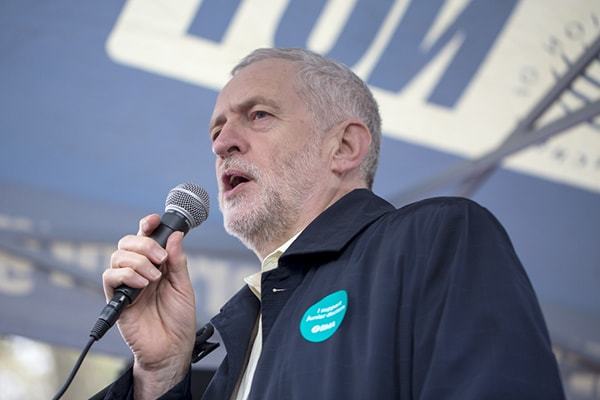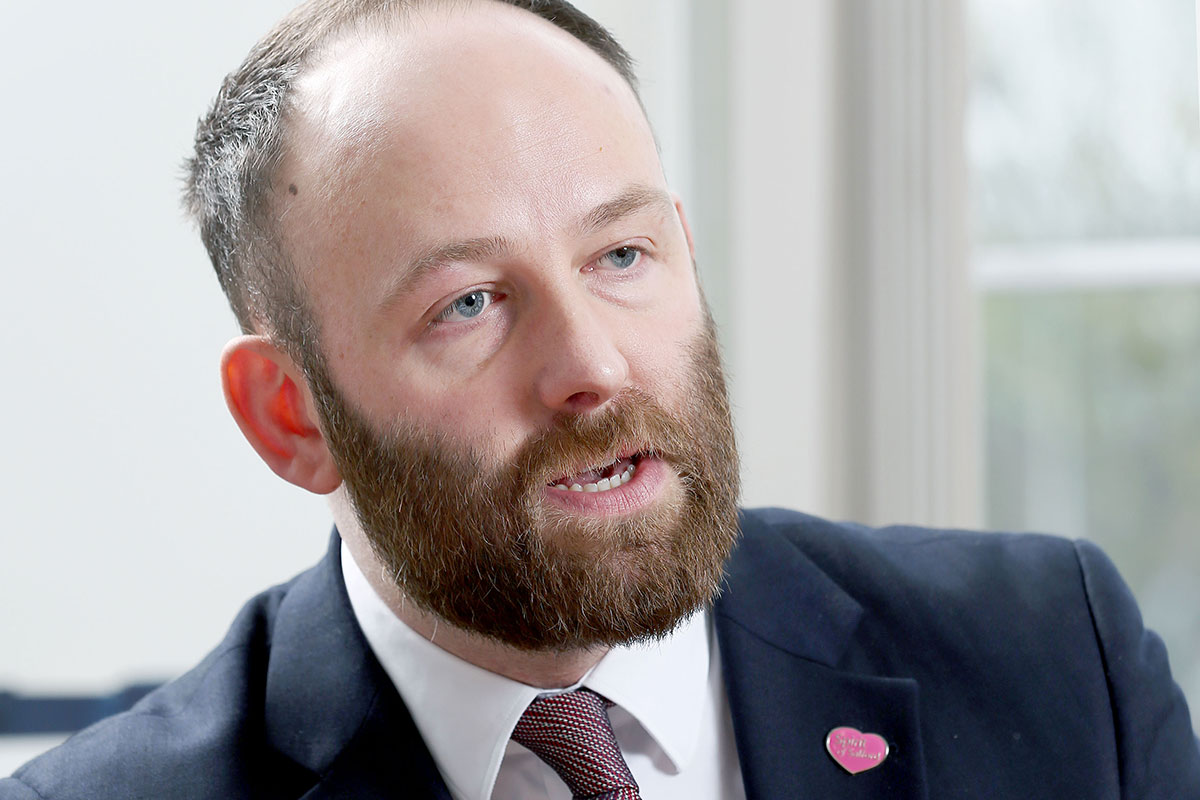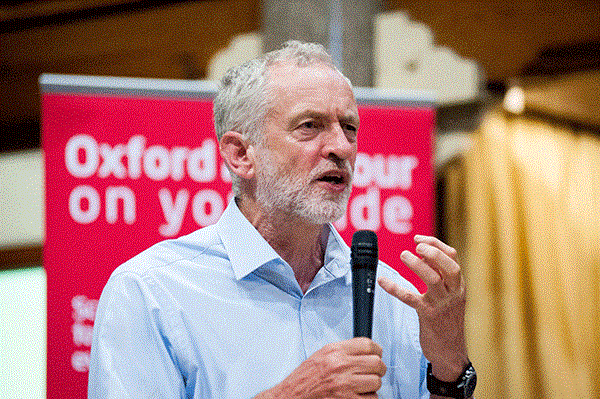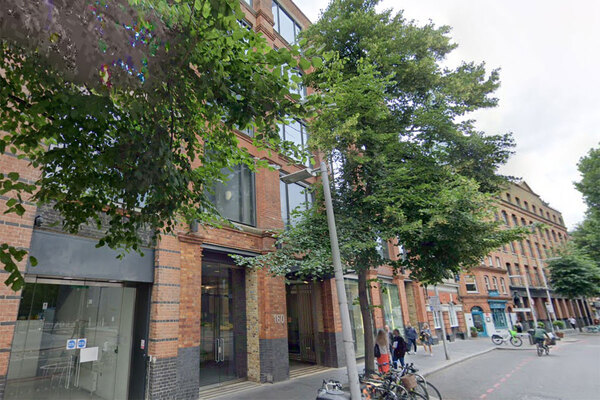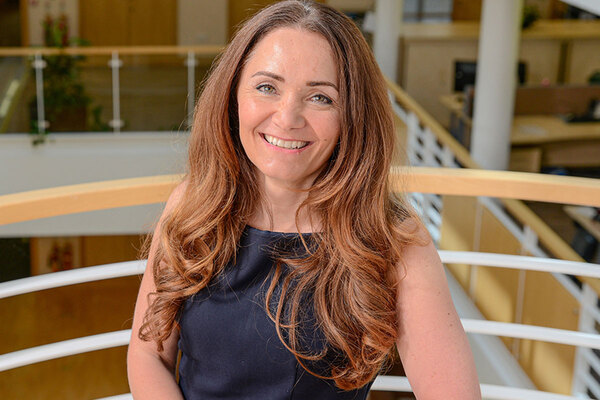You are viewing 1 of your 1 free articles
Salford’s way: an interview with mayor Paul Dennett
How will Greater Manchester’s plans be shaped by Paul Dennett, Salford’s Corbynist mayor who holds the region’s housing brief? Tom Wall reports. Photography by Lorne Campbell
The tram journey from Manchester city centre to its increasingly noisy neighbour, Salford, takes you past high rises, warehouse apartments and construction sites bristling with cranes – but also rows of rough sleepers under modern shopping arcades and homeless tent encampments on railway sidings.
It is these jarring contradictions of Manchester’s development boom that Paul Dennett – Salford’s Jeremy Corbyn-supporting, directly elected Labour mayor – is determined to avoid for his side of the River Irwell.
“I don’t believe in the supremacy of the market and I believe we need a more interventionist approach to how we deliver on housing,” he says, drumming the table in his town hall office, where piles of placards balance precariously on top of filing cabinets.
Mr Dennett was last year given the housing brief for the whole of Greater Manchester by metro mayor Andy Burnham.
All this means that Greater Manchester will be an interesting one to watch, as Mr Dennett puts his housing plans forth for the region.
There seems to be a clear difference of view here between Salford’s mayor and Manchester City Council, the biggest player in the region, which has repeatedly made the case that the city needs more homeownership and has a higher proportion of social rent than other areas.
“I’m not going to criticise Manchester City Council,” Mr Dennett says. “Ultimately they take their own decisions and we work collaboratively in the interests of Greater Manchester.”
Nonetheless, he also says: “At the moment in Greater Manchester we have 84,000 people on our housing waiting list, [and] between 300 and 400 people habitually sleeping rough on our streets. We have a significant problem.”
Whereas Manchester City Council leader Sir Richard Leese, who backed calls for Mr Corbyn to stand down in 2016, says city centre developments are providing “workers’ housing”, Mr Dennett talks about “unaffordable tower blocks” for “wealthy young professionals”.
“The market is producing a lot of housing that is not affordable for people,” Mr Dennett remarks.
Many of these tensions came to a head earlier this year when The Guardian examined planning documents and found that none of the 4,667 homes in big developments approved by Manchester City Council’s planning committee in the past two years were affordable, according to the government’s criteria of up to 80% of market rent.
Although the council later pointed out 33 additional developments did not go through its planning committee because no one objected, and these included 850 affordable homes, the figures nevertheless crystallised concerns about the make-up of Britain’s city centres.
Mr Dennett, who lives in a local council flat, blames the government’s National Planning Policy Framework for allowing developers to wriggle out of local affordable housing targets, but he believes he can get a better deal for Salford. “The government allows developers to make at least 20% before they even need to consider affordable housing or contributions to infrastructure,” he says. “But can we do it in a different way? In a better way? I believe we can.”
"We need an interventionist approach to how we deliver on housing."
Seventeen per cent of new homes built in Salford last year were affordable on the government’s definition. Mr Dennett admits it is nowhere near what the city needs: a further 760 new affordable homes each year.
Salford has also managed to squeeze more money out of developers. In 2016, it obtained £6.5m whereas Manchester City Council only managed £2.5m, according to figures from both councils. When these figures emerged, Mr Leese claimed that Salford only got more money because it has “lower housing standards” than Manchester. This line of argument doesn’t impress Mr Dennett. “That is absolute nonsense,” he guffaws, in what could be annoyance or exacerbation. “We do not accept that somehow we are going for a lower spec.”
Salford has used some of this development money to kick-start a wholly council-owned housing company, which is set to build the first council houses in Salford for a generation.
“We’ve used £2m that we’ve been able to get off developers and we’re putting that into our own company. We are going to be building truly affordable, socially rented accommodation,” he says.
The company, Derive, plans to build 67 council homes over the next five years. Around half will be at social rents and half will be at affordable rents.
While this will only help a small minority of the 7,000 people on Salford’s social housing waiting list, it is a statement of Mr Dennett’s intent. It is also arguably an achievement, given the city has lost half of its funding from central government since 2010. “I’d like to do more of this,” he says. “But we cannot do it at scale because we haven’t got the money coming through the door.”
Theresa May’s much-vaunted funding for a new generation of council homes is yet to make its way to this corner of the North West. “Homes England says it ‘hasn’t got policy clarity from government to release grant for social rent’ despite the prime minister saying in October she was ‘releasing £2bn for councils and housing associations to build social homes’. It hasn’t happened,” he says. “It is a disgrace.”
The name given to the company is yet more evidence of Salford’s ambition to be different from its bigger neighbour. Derive is an idea borrowed from the Situationists, a group of Marxist thinkers and experimental artists who came to prominence in the 1960s. “Derive was named by the council’s former housing cabinet member, Paul Longshaw, who passed away last year. It is based loosely on theories about creating new spaces and neighbourhoods that people feel comfortable in,” Mr Dennett says.
Yet Salford too has its share of high rises and profit-hungry developers.
Mr Dennett says the regeneration of the docks in the 1980s halted the decline of the city
Salford Quays – which was once the part of the huge docks that served the cargo boats on the Manchester Ship Canal – is now home to the BBC and ITV, as well as the Lowry theatre and a series of residential towers.
Mr Dennett says the regeneration of the docks in the 1980s halted the decline of the city but he wants to do more to make sure the poorest people share in the area’s new-found prosperity. “The city was in absolute free-fall back then. The population was declining and unemployment was rising,” he says. “But the real challenge for me is how to harness the growth to create opportunities for people in the city.”
When it comes to his Greater Manchester-wide role, Mr Dennett is currently giving the Greater Manchester Spatial Framework a radical makeover for Mr Burnham. The framework maps how the region will meet its growing housing and infrastructure needs.
“It’s about making sure we don’t just release land in a laissez-faire way, which is allowing the developers to dictate to us what happens in the city region,” he says. “I want to see us building houses that are truly and genuinely affordable.”
But metro mayors like Mr Burnham cannot impose their wishes on local authority leaders – who can simply refuse to agree to such plans.
This could be interesting. In September 2017, Mr Leese was quoted in the Manchester Evening News saying: “If it’s a Greater Manchester housing strategy, as long as it’s based on what we are doing that’s fine. If there are better ideas, then we’d look at them, clearly. But if there’s an attempt to impose, for example, more detailed numbers or the type of housing that should be built in Manchester, then I’m not going to support it.”
Mr Dennett shrugs: “We have to work together – there is no choice.”
While Mr Dennett accepts that authorities like Manchester City Council could in theory refuse to agree to the plan, he claims pressure from below will force change on them. “At the end of the day, power is a dynamic. It is not just about who leads the council or what the constitution says – change also comes though social movements,” he says.
Mr Dennett’s distrust of markets and passion to make the world a better place for those with the least goes back to his troubled, working-class childhood in Warrington.
His family was devastated when his father, who was an active trade unionist, lost his job at the local power station when it was privatised. “He took redundancy and we ended up moving into a pub. He became an alcoholic and the whole family unit was decimated. I saw poverty. I saw debt. I saw the despair on the part of my father, who couldn’t provide for the family any more.”
Mr Dennett developed a lifelong appreciation of public services when his eldest brother fell ill. “He had leukaemia as a child and for two years I never saw my parents – my grandparents looked after us at the time – because mum and dad were at the hospital.”
After he left home he worked in a BT call centre, completed a degree, then lectured in business studies. He was elected to Salford Council in 2012 and became mayor four years later.
Mr Dennett’s desire to wrestle back control from the private developers he feels have shaped the region’s boom cannot be doubted. Some have even suggested that Salford provides a glimpse of what a Corbyn-led government would do in power.
But Mr Dennett, who is currently facing another £11.2m worth of cuts this year, thinks there is only so much he can achieve under a Conservative government he believes is beholden to the housing market.
“The real prize is getting a Labour government under Jeremy Corbyn so we can do some transformational stuff,” he says. “That’s the absolute priority at the moment.”
At a glance: Labour’s social housing proposals
- Scrap the affordable rent product and introduce new income-linked rents
- Introduce a new “Decent Homes 2” target for social landlords to improve fire safety post-Grenfell
- Make housing associations subject to the Freedom of Information Act
- Prohibit for-profit housing associations
- Set a new target of one million new affordable homes over 10 years, mostly at social rent
- Impose a new duty to deliver affordable homes on councils, introducing a new needs assessment and an affordable new homes bonus
- Establish a new English Sovereign Land Trust to help councils acquire land more cheaply.
- Form a new national tenants’ organisation and commissioner
- A “longer-term aim” for half of all new homes to be “genuinely affordable”
- Give housing associations access to Public Works Loan Board finance
- Consider returning in full the Treasury’s previous year’s share of Right to Buy receipts
- Introduce a planning “presumption” that all developments, including rural and smaller sites, will include affordable housing
- Help councils with no stock to start a Housing Revenue Account
- Fast-track Karen Buck’s Homes (Fitness for Habitation) bill
- Consult on requiring landlords to publish an annual “outsourcing statement”
- Consult on housing associations to be required to have tenants on their boards
